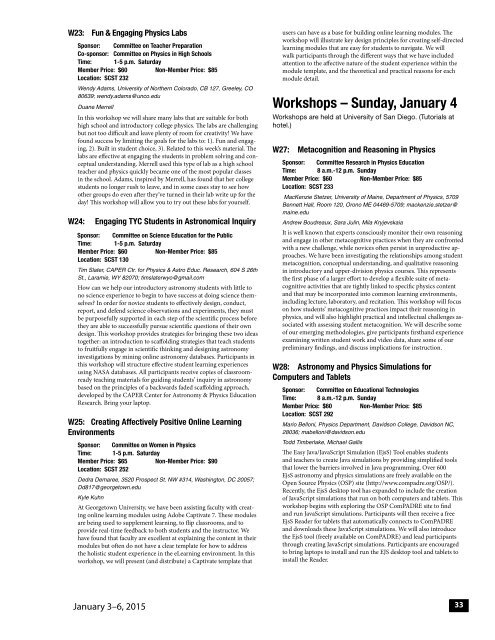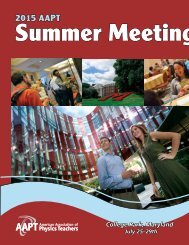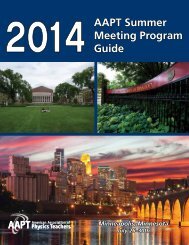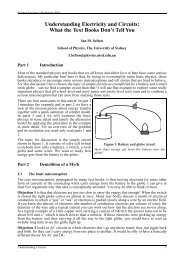final-program-12-23-14-3
final-program-12-23-14-3
final-program-12-23-14-3
You also want an ePaper? Increase the reach of your titles
YUMPU automatically turns print PDFs into web optimized ePapers that Google loves.
W<strong>23</strong>: Fun & Engaging Physics Labs<br />
Sponsor: Committee on Teacher Preparation<br />
Co-sponsor: Committee on Physics in High Schools<br />
Time: 1-5 p.m. Saturday<br />
Member Price: $60 Non-Member Price: $85<br />
Location: SCST <strong>23</strong>2<br />
Wendy Adams, University of Northern Colorado, CB <strong>12</strong>7, Greeley, CO<br />
80639; wendy.adams@unco.edu<br />
Duane Merrell<br />
In this workshop we will share many labs that are suitable for both<br />
high school and introductory college physics. The labs are challenging<br />
but not too difficult and leave plenty of room for creativity! We have<br />
found success by limiting the goals for the labs to: 1). Fun and engaging,<br />
2). Built in student choice, 3). Related to this week’s material. The<br />
labs are effective at engaging the students in problem solving and conceptual<br />
understanding. Merrell used this type of lab as a high school<br />
teacher and physics quickly became one of the most popular classes<br />
in the school. Adams, inspired by Merrell, has found that her college<br />
students no longer rush to leave, and in some cases stay to see how<br />
other groups do even after they’ve turned in their lab write up for the<br />
day! This workshop will allow you to try out these labs for yourself.<br />
W24: Engaging TYC Students in Astronomical Inquiry<br />
Sponsor: Committee on Science Education for the Public<br />
Time: 1-5 p.m. Saturday<br />
Member Price: $60 Non-Member Price: $85<br />
Location: SCST 130<br />
Tim Slater, CAPER Ctr. for Physics & Astro Educ. Research, 604 S 26th<br />
St., Laramie, WY 82070; timslaterwyo@gmail.com<br />
How can we help our introductory astronomy students with little to<br />
no science experience to begin to have success at doing science themselves<br />
In order for novice students to effectively design, conduct,<br />
report, and defend science observations and experiments, they must<br />
be purposefully supported in each step of the scientific process before<br />
they are able to successfully pursue scientific questions of their own<br />
design. This workshop provides strategies for bringing these two ideas<br />
together: an introduction to scaffolding strategies that teach students<br />
to fruitfully engage in scientific thinking and designing astronomy<br />
investigations by mining online astronomy databases. Participants in<br />
this workshop will structure effective student learning experiences<br />
using NASA databases. All participants receive copies of classroomready<br />
teaching materials for guiding students’ inquiry in astronomy<br />
based on the principles of a backwards faded scaffolding approach,<br />
developed by the CAPER Center for Astronomy & Physics Education<br />
Research. Bring your laptop.<br />
W25: Creating Affectively Positive Online Learning<br />
Environments<br />
Sponsor: Committee on Women in Physics<br />
Time: 1-5 p.m. Saturday<br />
Member Price: $65 Non-Member Price: $90<br />
Location: SCST 252<br />
Dedra Demaree, 3520 Prospect St. NW #3<strong>14</strong>, Washington, DC 20057;<br />
Dd817@georgetown.edu<br />
Kyle Kuhn<br />
At Georgetown University, we have been assisting faculty with creating<br />
online learning modules using Adobe Captivate 7. These modules<br />
are being used to supplement learning, to flip classrooms, and to<br />
provide real-time feedback to both students and the instructor. We<br />
have found that faculty are excellent at explaining the content in their<br />
modules but often do not have a clear template for how to address<br />
the holistic student experience in the eLearning environment. In this<br />
workshop, we will present (and distribute) a Captivate template that<br />
users can have as a base for building online learning modules. The<br />
workshop will illustrate key design principles for creating self-directed<br />
learning modules that are easy for students to navigate. We will<br />
walk participants through the different ways that we have included<br />
attention to the affective nature of the student experience within the<br />
module template, and the theoretical and practical reasons for each<br />
module detail.<br />
Workshops – Sunday, January 4<br />
Workshops are held at University of San Diego. (Tutorials at<br />
hotel.)<br />
W27: Metacognition and Reasoning in Physics<br />
Sponsor: Committee Research in Physics Education<br />
Time: 8 a.m.-<strong>12</strong> p.m. Sunday<br />
Member Price: $60 Non-Member Price: $85<br />
Location: SCST <strong>23</strong>3<br />
MacKenzie Stetzer, University of Maine, Department of Physics, 5709<br />
Bennett Hall, Room <strong>12</strong>0, Orono ME 04469-5709; mackenzie.stetzer@<br />
maine.edu<br />
Andrew Boudreaux, Sara Julin, Mila Kryjevskaia<br />
It is well known that experts consciously monitor their own reasoning<br />
and engage in other metacognitive practices when they are confronted<br />
with a new challenge, while novices often persist in unproductive approaches.<br />
We have been investigating the relationships among student<br />
metacognition, conceptual understanding, and qualitative reasoning<br />
in introductory and upper-division physics courses. This represents<br />
the first phase of a larger effort to develop a flexible suite of metacognitive<br />
activities that are tightly linked to specific physics content<br />
and that may be incorporated into common learning environments,<br />
including lecture, laboratory, and recitation. This workshop will focus<br />
on how students’ metacognitive practices impact their reasoning in<br />
physics, and will also highlight practical and intellectual challenges associated<br />
with assessing student metacognition. We will describe some<br />
of our emerging methodologies, give participants firsthand experience<br />
examining written student work and video data, share some of our<br />
preliminary findings, and discuss implications for instruction.<br />
W28: Astronomy and Physics Simulations for<br />
Computers and Tablets<br />
Sponsor: Committee on Educational Technologies<br />
Time: 8 a.m.-<strong>12</strong> p.m. Sunday<br />
Member Price: $60 Non-Member Price: $85<br />
Location: SCST 292<br />
Mario Belloni, Physics Department, Davidson College, Davidson NC,<br />
28036; mabelloni@davidson.edu<br />
Todd Timberlake, Michael Gallis<br />
The Easy Java/JavaScript Simulation (EjsS) Tool enables students<br />
and teachers to create Java simulations by providing simplified tools<br />
that lower the barriers involved in Java <strong>program</strong>ming. Over 600<br />
EjsS astronomy and physics simulations are freely available on the<br />
Open Source Physics (OSP) site (http://www.compadre.org/OSP/).<br />
Recently, the EjsS desktop tool has expanded to include the creation<br />
of JavaScript simulations that run on both computers and tablets. This<br />
workshop begins with exploring the OSP ComPADRE site to find<br />
and run JavaScript simulations. Participants will then receive a free<br />
EjsS Reader for tablets that automatically connects to ComPADRE<br />
and downloads these JavaScript simulations. We will also introduce<br />
the EjsS tool (freely available on ComPADRE) and lead participants<br />
through creating JavaScript simulations. Participants are encouraged<br />
to bring laptops to install and run the EJS desktop tool and tablets to<br />
install the Reader.<br />
January 3–6, 2015<br />
33






